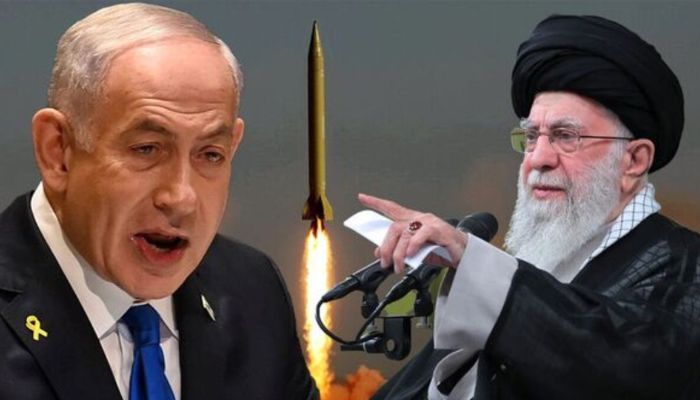
June 2025 has become a dangerous moment in the Middle East. For the first time, Israel and Iran are fighting each other directly, not just through secret missions or proxy groups. Missiles are flying, people are dying, and the world is watching nervously. But underneath the explosions and military strikes, there is an old and serious question that still has no answer: Why is Iran asked to stop its nuclear program, while Israel is not?
A History of Silent War
Since the Islamic Revolution in Iran in 1979, Israel and Iran have been bitter enemies. Before that, they were actually friends. But now, they fight in many ways—cyberattacks, assassinations, drone strikes, and through other groups like Hezbollah, Hamas, and militias in Syria and Iraq. This kind of hidden fight is called a "shadow war."
Israel has often attacked Iranian targets in Syria, trying to stop weapons from reaching Hezbollah. Iran supports groups that fight against Israel. But until this year, they never directly hit each other in open war. That changed.
The Latest Escalation
It all became more serious after the war in Gaza began in October 2023. In April 2024, Israel struck the Iranian consulate in Syria, killing senior military officers. Iran answered with a massive missile and drone attack on Israel. Then Israel hit back, this time inside Iran itself. Since then, assassinations and attacks have continued.
Now in June 2025, Israel has launched strikes deep inside Iran, hitting nuclear and military sites. Iran replied with missile attacks on Israeli cities. Many people, including children, have died. This is no longer a secret war—it is open and dangerous.
The Nuclear Question
At the center of this conflict is Iran’s nuclear program. Iran says it only wants nuclear power for energy and medicine. Israel and its allies say Iran wants a nuclear bomb. But here is where it becomes complicated.
Israel already has nuclear weapons. It is believed to have around 90 warheads. But Israel never says yes or no. It keeps quiet—this is called "nuclear ambiguity." Israel is not a member of the Nuclear Non-Proliferation Treaty (NPT), the international agreement to stop the spread of nuclear weapons.
Iran is a member of the NPT. That means it has promised not to build nuclear weapons. But it is still being punished—sanctioned, attacked, and inspected over and over again. Critics say this is a ‘double standard’.
Why is Iran asked to follow the rules, while Israel is not?
The Reason for the Double Standard
Supporters of Israel give several reasons:
* They say Israel is more stable and trusted, while Iran has hidden parts of its program in the past.
* They believe Iran’s leaders use strong, violent words against Israel, so a nuclear Iran would be a big threat.
* They say ‘Israel’s weapons are just for defense’, and have helped prevent more wars in the region.
* And since Israel never signed the NPT, they claim the treaty rules don’t apply to it.
But from Iran’s view—and from many others—this is unfair. Iran says:
“Why can Israel have nuclear weapons, but we cannot even have nuclear energy without being attacked?”
Iran and many Arab countries have long asked for a “nuclear-free Middle East.” This means that no country, not even Israel, should have weapons of mass destruction. Iran has made this demand for decades at the UN. But Israel refuses. It says it needs its weapons to survive, because many countries nearby want to destroy it.
Why Peace Is Hard
The truth is, both sides don’t trust each other. Iran sees Israel as aggressive and dangerous. Israel sees Iran as a threat to its very existence. And powerful allies like the United States always support Israel strongly. That makes any fair deal difficult.
The international community focuses mostly on stopping Iran, not on asking Israel to disarm. They say Iran broke the rules, while Israel never agreed to them in the first place. But this logic feels unfair to many people around the world.
What’s Next?
If this conflict continues, the risk of full war is real—and so is the danger of more countries trying to get nuclear weapons. The idea of a Middle East free of nuclear arms sounds like a dream. But maybe it is the only way to stop the nightmare we are seeing now.
Final Thoughts
The world must ask itself an honest question:
‘Can we truly stop the spread of nuclear weapons if we only enforce the rules on some, and not others?’
If peace is the goal, then fairness must be part of the process. Until then, the Israel-Iran conflict will keep burning—and the people of both countries, and some days may be world, will continue to pay the price.

Editor & Publisher
Dulal Ahmed Chowdhury
www.newsdiplomats.com
The News Diplomats
Cell: +1 (437) 365-4003 & +1 (647) 709-3389
Email: [email protected]
Toronto, Canada.
©২০২৩ সর্বস্বত্ব সংরক্ষিত || The News Diplomats